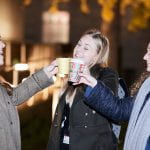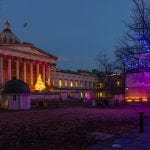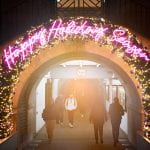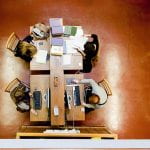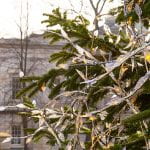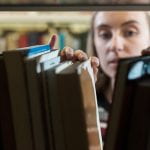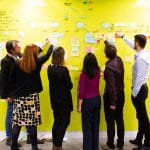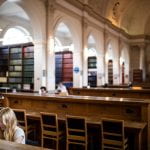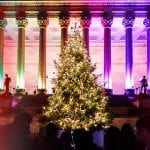This is the first instalment of our profile series, and we shine a light on Ben Watson, UCL’s Head of Digital Accessibility. Ben’s journey from teaching to digital accessibility shows his unwavering dedication to inclusivity. He works hard with the Digital Accessibility Team and together, they put in place and advocate for accessible digital practices. Below are the highlights of his conversation with the UCL Office for Open Science and Scholarship. Here, he shares his story and vision to make UCL more accessible.

Ben Watson
Current Role
Ben Watson describes his role as putting in ‘ramps and lifts’ to information. He underscores the need of making digital resources not only available but accessible to all. ‘My role is about ensuring that all UCL systems and content, and the way we design, deliver, and share information, addresses potential barriers. If digital resources aren’t accessible to everyone, their full potential remains untapped’.
Journey to Digital Accessibility
Ben’s path began with a background in teaching and librarianship. Early in his career, he worked at a school for blind and partially sighted students, where he discovered the transformative power of digital information. This experience ignited his passion for advocating better e-resources and focusing on accessible learning design. ‘I’ve always been fascinated by how people consume information. As a teacher, I saw how digital information should be the answer to many accessibility issues’.
Teaching Experience and Advocacy
His teaching background provided him with insights into diverse learning styles and the adverse impact of inaccessible materials. Now at UCL, the Digital Accessibility team assists research and teaching staff in meeting accessibility standards, promoting the idea that highly accessible digital experiences can only benefit students, staff, and institutions. ‘One of the really lovely things about digital accessibility and promoting it is that genuinely it’s one of those things that benefits everyone’.
Addressing Challenges and Organisational Change
Ben acknowledges the complexities of ensuring digital accessibility at a large institution like UCL. He emphasises the need to influence content creators to prioritise accessibility and integrate inclusive design from the outset. ‘To make UCL more digitally accessible, we must influence the entire information cycle. We need to support content creators to excel at what they are experts in while giving them confidence to deliver this accessibly. UCL can lead by example in many areas, including accessibility’.
Progress, Not Perfection
Ben champions the idea of progress over perfection in the evolving field of digital accessibility. ‘I always talk about progress, not perfection. In such a dynamic landscape, expecting 100% perfection is unrealistic, but we can certainly achieve significant, long-lasting positive progress’
Simple Steps for Digital Accessibility 
Making digital content accessible can be straightforward with built-in tools in software applications such as Microsoft’s Accessibility Checker. Ben also highlights the importance of structured headings, alternative text descriptions, and other features to make documents navigable for all users. ‘Simple steps like using headings, alternative text and accessibility checkers can greatly enhance accessibility. UCL Accessibility pages offer extensive guidance on this to support UCL staff’
Accessibility and Open Science: Benefits for All
We asked Ben how accessibility principles can advance Open Science and Scholarship. He advocates for making research accessible to everyone. This involves adding accessibility standards to open science publishing. ‘Publishers need to meet these standards for Open Access to reach its full potential. This helps everyone by boosting the reach and impact of research.’ Challenges exist, but the benefits of accessibility are broad. Accessibility improves research impact, openness, and discoverability. ‘At the end of the day, this isn’t just about legal mandates for public sector bodies, although that’s a compelling reason. It’s about fulfilling ethical obligations to ensure that everyone can fully engage. Why should we prevent anyone from being inspired and affected by our work? With some effort, but not a huge amount, we could make our work future-proof and accessible to everyone’
European Accessibility Regulations
Ben is enthusiastic about the European Accessibility Act, which extends obligations to commercial suppliers beyond existing legislation. He views this as a significant advancement for the education sector, making it easier to ensure accessibility compliance from the design stage. ‘The European Accessibility Act is a powerful addition to existing legislation. It mandates accessibility by default, simplifying our work to ensure compliance’
Proactive Accessibility and Legacy Content
It’s much more challenging to retrofit accessibility into already published content, that’s why proactive measures are key. ‘It’s much more difficult to make something accessible after it’s been published. UCL collaborates with partners like the Royal National Institute for Blind People to review legacy content. We aim to integrate accessibility from the start and have clear processes for addressing older content’
Envisioning the Future
Ben hopes for a future where digital accessibility is an integral part of everyday life and education. He highlights UCL’s research initiatives, like the Global Disability Innovation Hub, and the work of the Institute of Education at UCL (with telepresence robot projects like the one led by Jennifer Rode) as examples of a commitment to global outreach and inclusive design. ‘I’d love the field of digital accessibility to become everyone’s business as usual. It should be included in standard training, teacher qualifications, and even the school curriculum because it’s really that important’
Accessibility is Not Just About Compliance
We should advocate for a holistic approach to accessibility, considering diverse needs, including those of neurodiverse individuals. Ben stresses the importance of inclusive design in education, promoting flexible assessment methods and delivery modes. ‘Accessibility isn’t just about compliance; it’s about creating inclusive experiences that anticipate diverse needs. By embedding accessibility into every aspect of education, we enable everyone to reach their full potential’
Librarians are Awesome
Ben’s transition from librarianship to digital accessibility was one of the focal points of his career. Working as a librarian provided him with a unique perspective on accessibility and understanding on how people engage with information. ‘I think about information like a librarian—considering how people find and use it. This perspective is essential for ensuring digital content is accessible’. As a librarian, his involvement in e-book accessibility campaigns solidified his dedication to making digital resources accessible to all. ‘Librarians play a crucial, often underappreciated role in advocating for accessible information. It’s no wonder Michael Moore calls them the most important public servants in a democracy’
Accessibility Can Make a Difference
He explains that his commitment to accessibility comes from a deep belief in equitable information access. He is driven by a desire to remove barriers to inclusion and citizenship. ‘I’ve seen firsthand the impact of inaccessible information—it can hinder potential and make people feel excluded. My motivation is to remove barriers and ensure everyone feels included and respected. Information is vital for education and broader citizenship. Accessible design, is good design, and ensures no one is excluded and that information is adaptable for new technologies like AI’.
Inspirations
Ben draws inspiration from key figures in disability studies, such as British sociologist and activist Mike Oliver, a founding theorist of the social model of disability. ‘Meeting Professor Mike Oliver at the University of Kent profoundly influenced my work. His theories on disability have been foundational.’ He also acknowledges the contributions of colleagues like Kirsty Wallis in raising accessibility awareness in open science. ‘Kirsty’s work in promoting accessibility in open science has been outstanding.’
Passions
Outside of his professional life, Ben takes greater pride in his daughters’ kindness: ‘I’m incredibly proud of my two daughters. They are kind, caring, and thoughtful young people who genuinely put the feelings of others before their own’. He also has a passion that takes him on quite a ride: ‘I love motorbikes. Riding them, fixing them, and generally thinking about them!’
UCL’s Vision: We Should Lead by Example
Ben advocates for UCL to be a leader in digital accessibility and inclusive design. ‘UCL can lead by example, ensuring accessibility is integral to everything we do. Accessibility is not extra work; it’s about completing what was left unfinished. Embracing this ethos across UCL would ensure no work is deemed complete until it’s accessible to all’.

UCL Digital Accessibility Team.
Ben Watson’s work at UCL shows he is strongly committed to making information and education open and inclusive. He invites everyone to embrace inclusive design at UCL with the Digital Accessibility Team. Through a collaborative effort, we can pave the way for a better future.
Follow Ben’s lead. Integrate accessibility into your work by following the steps provided on the UCL Accessibility Pages. You could also attend a Digital Skills training course, or join the Accessibility Champions Network.
For more information or help, check out the Digital Accessibility Services, or contact the Digital Accessibility Team.
Get involved!
 The UCL Office for Open Science and Scholarship invites you to contribute to the open science and scholarship movement. Stay connected for updates, events, and opportunities. Follow us on X, formerly Twitter, LinkedIn, and join our mailing list to be part of the conversation!
The UCL Office for Open Science and Scholarship invites you to contribute to the open science and scholarship movement. Stay connected for updates, events, and opportunities. Follow us on X, formerly Twitter, LinkedIn, and join our mailing list to be part of the conversation!
 Close
Close




